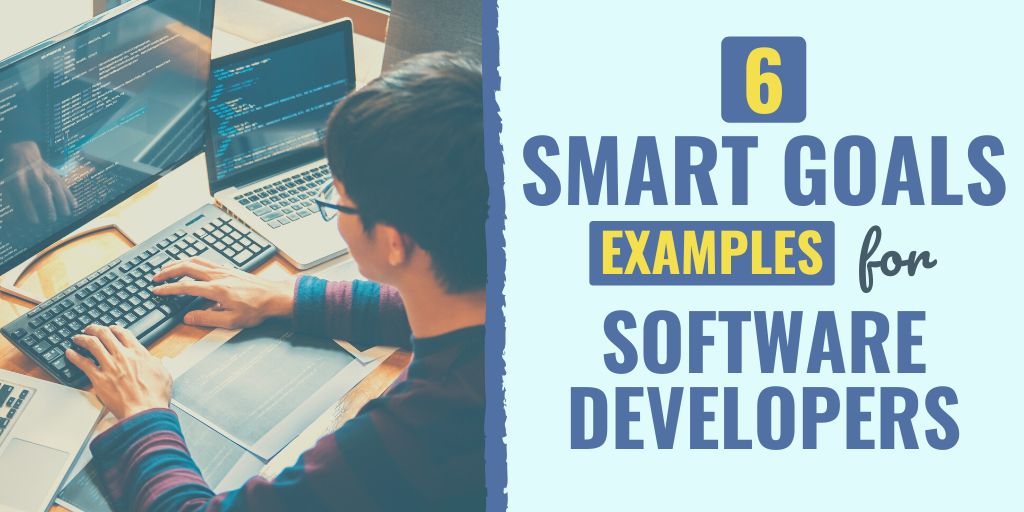There might be affiliate links on this page, which means we get a small commission of anything you buy. As an Amazon Associate we earn from qualifying purchases. Please do your own research before making any online purchase.
Being a software developer can be very steady work with a lucrative salary. However, if you are a beginner software developer, you will face many challenges in your career, which we will discuss below.
But, an excellent way to overcome problems you might face is using SMART goals. This article looks at 6 SMART goal examples for software developers.
If you don’t know what SMART goals are, we’ll start off by explaining them. Then, we’ll discuss why SMART goals are essential for software developers, followed by 6 examples of these goals.
What Are SMART Goals?
SMART is an acronym that pertains to setting goals. Specifically, it is one of the most effective goal-setting strategies. The SMART acronym is specific, measurable, attainable, relevant, and timebound.
When you set a goal, you want your goal to adhere to all five of those central tenets, so achieving your goals becomes much more manageable. Let's look at what each of those five letters stands for.
If you want to learn more about SMART goals, we recommend checking out this Ultimate Guide to SMART goals.
Why Are SMART Goals Important for Software Developers?
Software developers face many different challenges, particularly if they are just starting out. One of the most significant issues is an unestablished project environment and a lack of proper project infrastructure.
Another challenge software developers face is that there are often very unspecific requirements. As a result, ensuring that the project outcome aligns with the needs is easier said than done.
On that note, quality assurance is another issue software developers face. Many miss errors or don't review code, which results in a subpar product, usually just to meet deadlines.

Moreover, being able to meet deadlines is often the biggest challenge. When software developers are racing to finish a project, they might work between 12 and 16 hours a day, seven days a week. This can lead to increased levels of stress, anxiety, and other issues related to being overworked.
Yet another challenge is project management. If you have many factors to deal with, being able to properly manage your time and resources can be a challenge.
This is also the case when working with other team members, especially in communication and coordination. More than one person works on a software project, sometimes dozens or even hundreds. Then, you must prevent security breaches from occurring with your software.
As you can see, software developers face many challenges, and we’ve only scratched the surface. However, no matter the challenge, using SMART goals can help overcome them.
Using SMART goals can set specific and measurable goals to overcome certain problems. The trick is to make sure that you follow all five letters in the SMART acronym. If you do so, overcoming challenges becomes more accessible.
6 SMART Goals Examples for Software Developers
1. Ensure Precise Project Requirements
“My goal is to ensure I have precise project requirements before beginning the project. I will do this by questioning the relevant parties about their expectations and requirements. Then, if I have any assumptions, I will confirm them with the client, and I will continue to validate progress with the client every time another part of the project has been completed.”
S: This goal is explicit—to identify all requirements for the project before it commences through questing relevant parties.
M: In terms of achieving those requirements stated by the clients, this is measurable because you can check off the requirements you have met and which you have not.
A: This goal is easily attainable because it concerns communication.
R: This goal is relevant because you need to know the requirements and how to meet them to do an excellent job with any software development.
T: This goal is timebound—to identify the necessary requirements before beginning the project.
2. Complete Projects On Time
“My goal is to complete the project by the deadline, which is 90 days from now. I will do so by working no less than 10 hours a day, 6 days a week, and aim to complete at least 35% of the project every 30 days.”
S: The goal is specific—to meet the 90-day deadline by working no less than 10 hours per day and 6 days per week and completing 35% of the project every 30 days.
M: This goal is measurable because you can determine how long you work each day and how far along with the project by each 30-day mark.
A: This goal is certainly attainable for any software developer. Working 10 hours per day is less than usual for the average software developer.
R: This goal is relevant because the job of a software developer involves meeting deadlines.
T: This goal is timebound—to complete a percentage of the project within specific periods.
3. Ensure Optimal Team Communication
“My goal is to ensure optimal communication between myself and my teammates to coordinate all efforts across the board. I will contact all teammates every morning and when any problems arise.”
S: This goal is specific—to communicate with teammates at least once per day in the morning.
M: This goal is easy to measure simply by keeping track of when and how often you communicate with your teammates.
A: This goal is easy to attain using a combination of communication methods available to everybody.
R: This goal is relevant because completing software development projects generally involves working closely with teammates and requires good communication.
T: This goal is timebound because you have to communicate with these people every morning.
4. Learn a New Program Every 3 Months
“My goal is to learn a new computer coding or software development program every 3 months. Starting tomorrow, I will begin learning C++ and aim to have it mastered within 3 months. I will do so by taking the necessary classes or lessons.”
S: This goal is specific—to learn a new programming language within three months and to continue learning new ones every three months.
M: This goal is measurable because you can determine if you have mastered a computer programming system within those three months.
A: This goal is attainable because most people don't take three months to learn a new programming language.
R: This goal is relevant because software development constantly changes, and so does the software used to develop new apps and systems.
T: This goal is timebound—to learn a new programming language every three months.
5. Hold Conflict Resolution Sessions
“My goal is to hold one conflict resolution session every week between myself and my teammates. The first session will happen next week, and I will aim to resolve the conflict I have been experiencing with another teammate. If the conflict has not been resolved within the month, appropriate steps will have to be taken, such as replacing the team member causing the issue.”
S: This goal is specific—to have a conflict resolution session every week to resolve specific conflicts.
M: This goal is measurable, at least subjectively, because you can judge how much conflict there is from one week to another.
A: This goal is attainable because there are many conflict resolution methods and team-building exercises that can be done to resolve issues.
R: This goal is relevant because teammates have to be able to work closely together to complete projects by deadlines.
T: This goal is timebound—to have a weekly session and resolve the conflict within the next month.
6. Master Shortcuts and Tricks
“My goal is to master the shortcuts and tricks available in my current programming software within the next month to streamline the design process and help meet deadlines. I will do so by asking anybody who knows the coding system, using paid lessons, and taking advantage of free online tutorials, such as YouTube.”
S: This goal is specific—to master the tricks in a particular piece of software within the next month. This will be done by using various learning methods.
M: This goal is measurable because you can list the shortcuts you want to learn and then check them off as you master them.
A: This goal is attainable because some people and resources can help you find the tricks and shortcuts used in programming various software.
R: This goal is relevant because the more knowledge you have of a specific program, the better and faster you can develop software.
T: This goal is timebound because the aim is to learn the tricks within the next month.
Final Thoughts on SMART Goals for Software Developers
There are many obstacles that you will face as a software developer. However, with SMART goal-setting methods, you should be able to overcome the challenges. So, start by creating a list of challenges you face, and then develop the goals to overcome them. Start being a successful software developer today!
And if you want more SMART goal ideas and examples, be sure to check out these blog posts:
- 23 SMART Goals Examples for Your Work
- 13 SMART Goals Examples for Improving Your Communication Skills
- 7 Examples of SMART Goals for Project Management
Finally, if you want to take your goal-setting efforts to the next level, check out this FREE printable worksheet and a step-by-step process that will help you set effective SMART goals.


